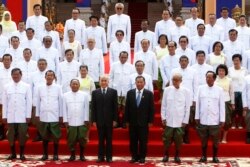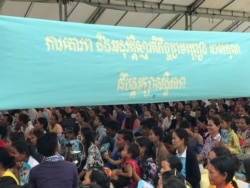Nearly three decades after the Paris Peace Agreement ushered in a fledgling liberal, multiparty democracy in Cambodia, observers said any progress made on human rights protections and political participation have faded with Cambodia’s pivot to a de facto one-party state.
Friday marks the 29th anniversary of the historic agreement that saw four warring factions end civil strife that had plagued the country since the 1970s. The agreement put in motion a United Nations-backed transition to multiparty democracy in 1992, with the first elections overseen by the multilateral agency.
Observers and commentators point out that the agreement paved the way for a Cambodian Constitution that protected citizens’ fundamental rights and increased political inclusion. But, with the recent crackdown on the political opposition, free press, and rights and youth activists, much of the agreement's principles had fallen by the wayside.
Soeung Sen Karuna, a senior investigator with rights group ADHOC, said there was a serious deterioration of human rights protections in the country, a central tenet of the Paris Peace Agreement, especially with the persecution of government critics and muzzling of free speech and assembly.
“The fundamental rights referred to as the right to assembly, expression, association are under restriction, resulting in groups critical of the government facing repercussions, such as beatings, and arrests,” he said.
Following the dissolution of the Cambodia National Rescue Party in 2017 and the Cambodian People’s Party whitewash of the parliamentary elections in 2018, where it won all elected seats in the Senate and National Assembly, the government has since sustained a campaign to target former members of the opposition, activists, journalists, and artists.
According to the local rights group Licadho, 19 unionists, rights advocates, activists, and artists have been detained since July for exercising their right to expression and peaceful assembly, as enshrined in the constitution.
In recent weeks, the government has escalated its persecution of former members of the CNRP, who have been arrested for supporting the party’s exiled leadership or for allegedly indulging in political and anti-national activities.
Cambodian authorities have also arrested more than 30 people from January to April on the grounds of allegedly spreading fake news related to COVID-19, according to U.S.-based rights watchdog Human Rights Watch. The organization characterized these arrests as an attempt to suppress voices critical of the government's response to the pandemic and its economic impact.
Chin Malin, the spokesperson for the Ministry of Justice, defended the government’s actions and criticized Cambodians with “political tendencies” for attacking the judiciary for being corrupt.
“However, when we enforce the law on their peers for violating the law and when the court is following the procedure, they put pressure and call on the government to intervene in the court's affairs to release them,” he said.
“This clearly shows that they carry out their work with double standards,” Chin Malin added.
CPP Senator Sok Eysan said every Cambodian enjoyed the protections and peace assured by the Paris agreement, and that any law enforcement actions were against enemies of the state, who were trying to destroy the core principles of the agreement.
“For the protection of the Paris Peace Agreement, the government took legal actions to curb all hostile activities, which would harm the spirit of this Paris Peace Agreement,” he said.
Last year, the government canceled the Paris Peace Agreement national holiday permanently, as part of reform measures to increase the number of working days in the year.
Despite this, civil society groups in Cambodia have informed Phnom Penh City Hall that they intend to mark the anniversary at Freedom Park’s new location in Russei Keo district. City Hall has rarely permitted groups from gathering at Freedom Park, but has limited Friday’s gathering to a maximum of 120 participants.
Exiled members of the opposition are using the upcoming anniversary to protest Cambodia’s sway towards China with more specific allegations of a Chinese military presence in the Kingdom.
The United States and opposition have been critical of alleged plans by the Cambodian government to allow the Chinese People’s Liberation Army military access to two potential sites in Cambodia – the Ream Naval Base in Preah Sihanouk province and the potential military use of the Dara Sakor Resort in Koh Kong province.
The members of dissolved CNRP said they were marking the day with protests in Paris and other countries with former party president, Sam Rainsy, calling on all Cambodians to protest against the alleged Chinese military presence in Cambodia.
The announcement drew a sharp response from Prime Minister Hun Sen, who was touring flood-affected areas in the northwest of the country. Hun Sen warned against any protests outside the Chinese Embassy in Phnom Penh on Friday, though it was unclear if CNRP supporters in the capital planned to demonstrate there.
“It's nearly October 23; I would like to say to those who want to hold protests in front of the Chinese Embassy in Phnom Penh to be careful,” he said in Banteay Meanchey province on Wednesday. “Don't mess around with this.”











